英语语法名师超级讲义之形容词副词(人大附中名师内部讲义)
- 格式:doc
- 大小:61.00 KB
- 文档页数:7
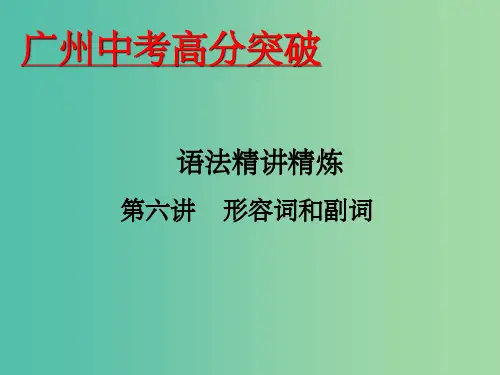
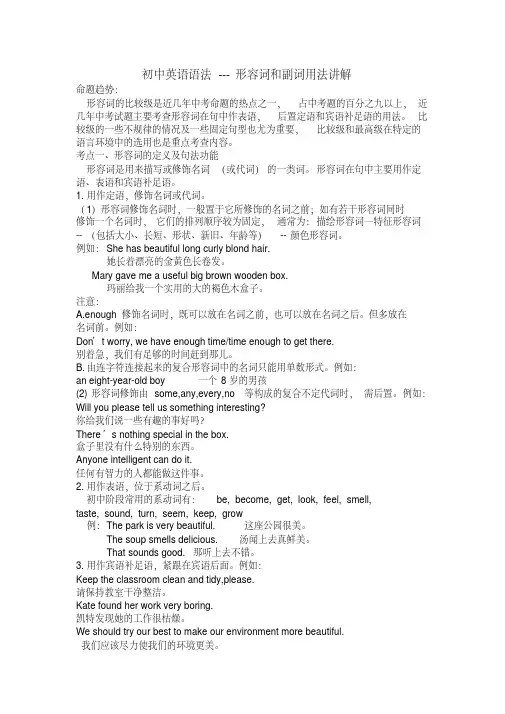
初中英语语法---形容词和副词用法讲解命题趋势:形容词的比较级是近几年中考命题的热点之一,占中考题的百分之九以上,近几年中考试题主要考查形容词在句中作表语,后置定语和宾语补足语的用法。
比较级的一些不规律的情况及一些固定句型也尤为重要,比较级和最高级在特定的语言环境中的选用也是重点考查内容。
考点一、形容词的定义及句法功能形容词是用来描写或修饰名词(或代词)的一类词。
形容词在句中主要用作定语、表语和宾语补足语。
1.用作定语,修饰名词或代词。
(1)形容词修饰名词时,一般置于它所修饰的名词之前;如有若干形容词同时修饰一个名词时,它们的排列顺序较为固定,通常为:描绘形容词—特征形容词--(包括大小、长短、形状、新旧、年龄等)--颜色形容词。
例如:She has beautiful long curly blond hair.她长着漂亮的金黄色长卷发。
Mary gave me a useful big brown wooden box.玛丽给我一个实用的大的褐色木盒子。
注意:A.enough修饰名词时,既可以放在名词之前,也可以放在名词之后。
但多放在名词前。
例如:Don’t worry, we have enough time/time enough to get there.别着急,我们有足够的时间赶到那儿。
B.由连字符连接起来的复合形容词中的名词只能用单数形式。
例如:an eight-year-old boy 一个8岁的男孩(2)形容词修饰由some,any,every,no等构成的复合不定代词时,需后置。
例如:Will you please tell us something interesting?你给我们说一些有趣的事好吗?There’s nothing special in the box.盒子里没有什么特别的东西。
Anyone intelligent can do it.任何有智力的人都能做这件事。
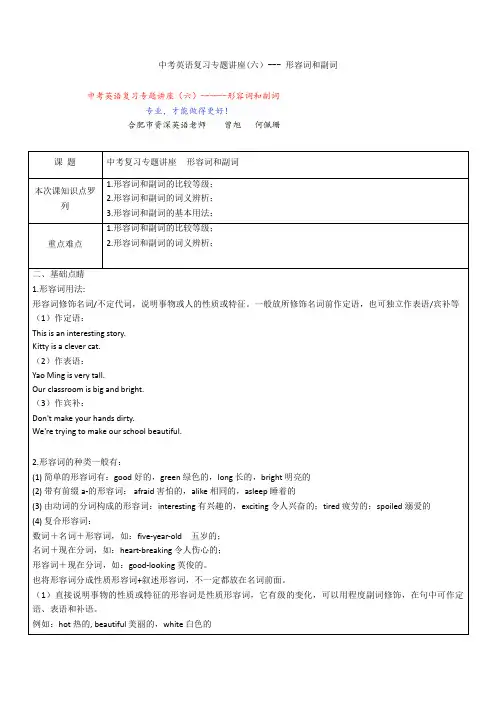
中考英语复习专题讲座(六)--- 形容词和副词中考英语复习专题讲座(六)------形容词和副词专业,才能做得更好!合肥市资深英语老师曾旭何佩珊二、英语书面表达专项训练2.环境保护人人有责,如果我们每一个人都能珍爱美丽地球保护自然资源,相信我们的家园会越来越美好。
某英文网站正在开展以“Going Green”为主题的征文活动。
假如你是李华,请用英语写一篇短文投稿,谈谈我们面临的主要环境问题是什么,为改善环境我们能做什么,以及你的期望。
提示词语: pollution, protect, save, recycle, take action提示问题:● What are the main environmental problems we have?● What can we do in our daily life? ● What’s your wish?Now there are many environmentalproblems._______________________________________________________________________ _______________________________________________________________________________ _______________________________________________________________________________ _______________________________________________________________________________ _______________________________________________________________________________ _______________________________________________________________________________ _______________________________________________________________________________ _______________________________________________________________________________ ____________________________________________________________【答案】例文Now there are many environmental problems. Such as air pollution, water pollution and so on.I believe that there are many things we can do in our daily life, we can save energy by go to school by bike or on foot. We can use less water by turning off the tap while we brush our teeth, and taking shorter showers. When we see litter on the ground, we must pick it up and put it into different bins.I hope everyone can take action. Although each one of us may only do a little, together we can make a big difference. Let’s work together to make a better place to live.【解析】【详解】题干解读:该题目属于说明文写作,写作时要把我们面临的主要环境问题是什么,为改善环境我们能做什么,以及你的期望全部包括。
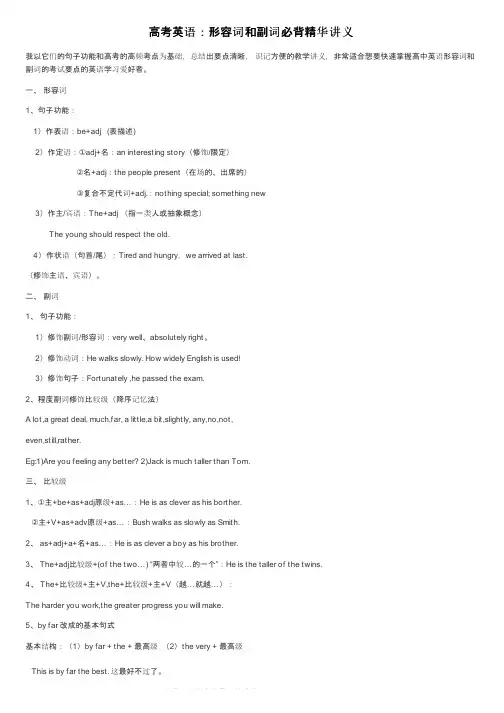
高考英语:形容词和副词必背精华讲义我以它们的句子功能和高考的高频考点为基础,总结出要点清晰,识记方便的教学讲义,非常适合想要快速掌握高中英语形容词和副词的考试要点的英语学习爱好者。
一、形容词1、句子功能:1)作表语:be+adj (表描述)2)作定语:①adj+名:an interesting story(修饰/限定)②名+adj:the people present(在场的、出席的)③复合不定代词+adj.:nothing special; something new3)作主/宾语:The+adj (指一类人或抽象概念)The young should respect the old.4)作状语(句首/尾):Tired and hungry,we arrived at last.(修饰主语、宾语)。
二、副词1、句子功能:1)修饰副词/形容词:very well、absolutely right。
2)修饰动词:He walks slowly. How widely English is used!3)修饰句子:Fortunately ,he passed the exam.2、程度副词修饰比较级(降序记忆法)A lot,a great deal, much,far, a little,a bit,slightly, any,no,not,even,still,rather.Eg:1)Are you feeling any better? 2)Jack is much taller than Tom.三、比较级1、①主+be+as+adj原级+as…:He is as clever as his borther.②主+V+as+adv原级+as…:Bush walks as slowly as Smith.2、 as+adj+a+名+as…:He is as clever a boy as his brother.3、 The+adj比较级+(of the two…) “两者中较…的一个”:He is the taller of the twins.4、 The+比较级+主+V,the+比较级+主+V(越…就越…):The harder you work,the greater progress you will make.5、by far 改成的基本句式基本结构:(1)by far + the + 最高级(2)the very + 最高级This is by far the best. 这最好不过了。
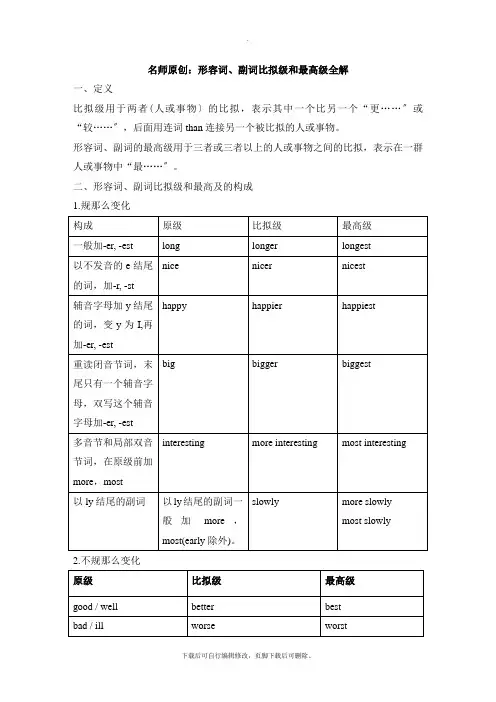
名师原创:形容词、副词比拟级和最高级全解一、定义比拟级用于两者(人或事物〕的比拟,表示其中一个比另一个“更……〞或“较……〞,后面用连词than连接另一个被比拟的人或事物。
形容词、副词的最高级用于三者或三者以上的人或事物之间的比拟,表示在一群人或事物中“最……〞。
二、形容词、副词比拟级和最高及的构成1.规那么变化2.不规那么变化三、比拟级的用法“主语+(is, am, are) +形容词比拟级+ than+比拟对象〞。
than后接人称代词时可以是主格或宾格。
than前后比拟对象必须是同一范畴,即同类事物之间的比拟。
如:She is a little more outgoing than me/I.她比我性格外向一点儿。
2. 比拟级可以用much, a little, a lot, even, rather, still, any, a bit, far等修饰,起强调作用。
如:It’s cold today, but it is going to be even colder tomorrow.今天很冷,但明天会更冷。
3. 当两者比拟只出现一方,含有of the two构造时,比拟级前要加the,意为“两个中比拟……的一个〞。
如:He is the taller of the two boys.他是两个男孩中个子较高的一个。
4.比拟级+and+比拟级,表示“越来越……〞;the+比拟级……,the+比拟级……意为“越……,就越……〞。
如:It gets warmer and warmer when spring comes.春天来了,天气变得越来越暖和了。
The more w e get together, the happier we’ll be.我们相聚越多,我们就越幸福。
5.“形容词比拟级+ than any other+单数可数名词〞表示“……比其他任何……都……〞,此构造可以换成最高级。
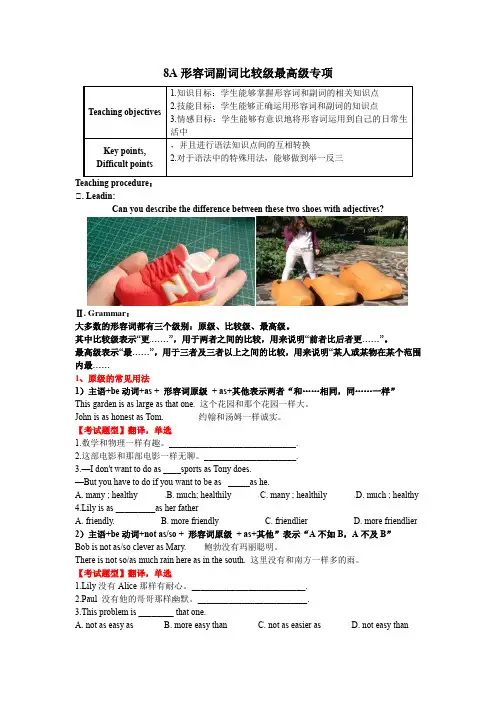
8A形容词副词比较级最高级专项1.知识目标:学生能够掌握形容词和副词的相关知识点2.技能目标:学生能够正确运用形容词和副词的知识点3.情感目标:学生能够有意识地将形容词运用到自己的日常生活中,并且进行语法知识点间的互相转换Ⅰ. Leadin:Can you describe the difference between these two shoes with adjectives?Ⅱ. Grammar:大多数的形容词都有三个级别:原级、比较级、最高级。
其中比较级表示“更……”,用于两者之间的比较,用来说明“前者比后者更……”。
最高级表示“最……”,用于三者及三者以上之间的比较,用来说明“某人或某物在某个范围内最……1、原级的常见用法1)主语+be动词+as + 形容词原级+ as+其他表示两者“和……相同,同……一样”This garden is as large as that one. 这个花园和那个花园一样大。
John is as honest as Tom. 约翰和汤姆一样诚实。
【考试题型】翻译,单选1.数学和物理一样有趣。
_____________________________.2.这部电影和那部电影一样无聊。
_____________________.3.—I don't want to do as ____sports as Tony does.—But you have to do if you want to be as_____as he.A.many ; healthyB.much; healthilyC.many ; healthilyD.much ; healthy4.Lily is as _________as her fatherA.friendly.B.more friendlyC.friendlierD.more friendlier 2)主语+be动词+not as/so + 形容词原级+ as+其他”表示“A不如B,A不及B”Bob is not as/so clever as Mary. 鲍勃没有玛丽聪明。
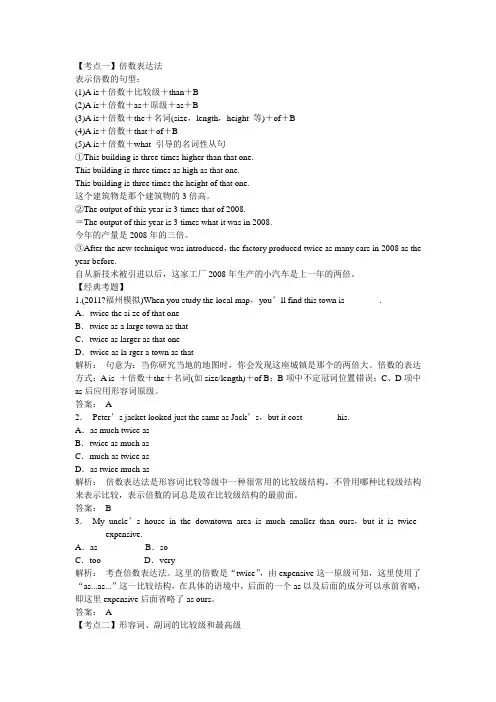
【考点一】倍数表达法表示倍数的句型:(1)A is+倍数+比较级+than+B(2)A is+倍数+as+原级+as+B(3)A is+倍数+the+名词(size,length,height 等)+of+B(4)A is+倍数+that+of+B(5)A is+倍数+what 引导的名词性从句①This building is three times higher than that one.This building is three times as high as that one.This building is three times the height of that one.这个建筑物是那个建筑物的3倍高。
②The output of this year is 3 times that of 2008.=The output of this year is 3 times what it was in 2008.今年的产量是2008年的三倍。
③After the new technique was introduced,the factory produced twice as many cars in 2008 as the year before.自从新技术被引进以后,这家工厂2008年生产的小汽车是上一年的两倍。
【经典考题】1.(2011?福州模拟)When you study the local map,you’ll find this town is________.A.twice the si ze of that oneB.twice as a large town as thatC.twice as larger as that oneD.twice as la rger a town as that解析:句意为:当你研究当地的地图时,你会发现这座城镇是那个的两倍大。
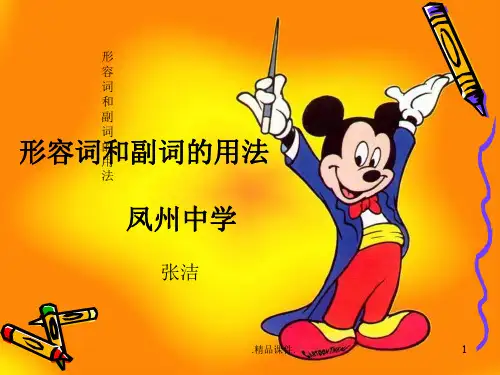
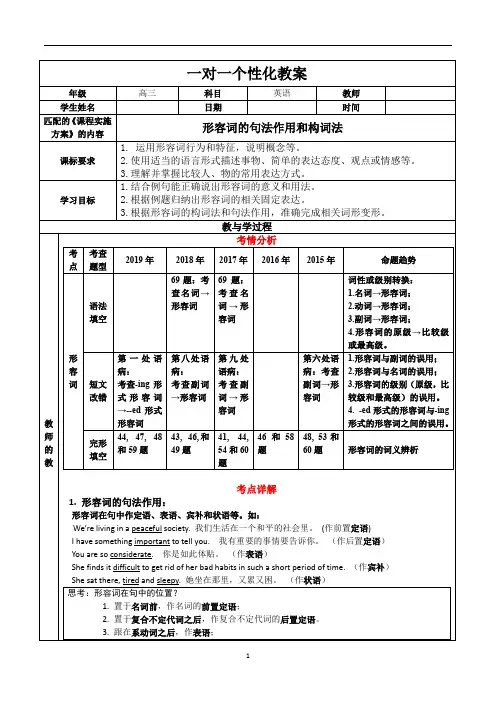
一. 句子填空。
1.(2016·北京,阅读D)It is not ________(surprise) that young people are likely to burst out, particularly when there are reasons to do so.2.(2016·四川,阅读B)You can live a more ________(power) life when you devote some of your time and energy to something much larger than yourself.3.(2016·江苏,阅读C)In the laboratory, chimps don’t naturally share food either.Human children, on the other hand are extremely ________(cooperate).4.(2015·江苏,31)The police officers decided to conduct a thorough and ________(comprehension) review of the case.5.(2015·湖北,28)I don't think what he said is ________(relevance) to the topic we are discussing.He has missed the point.6.(2015·安徽,26)I'm so________(gratitude) to all those volunteers because they helped my terrible day end happily.7.(2014·福建,24) With online shopping increasingly popular,the Internet is seen as a(n) ________(efficiency) way of reaching target customers.8.(2014·湖北,27) What was so ________(impress) about Jasmine Westland's victory was that she came first in the marathon barefooted.9.(2016·广州六校联考) Some experts believe it’s a________(worry) trend.10.(2016·银川一中高三一模) It is natural that young people are often________(comfort) when they are with their parents.11.(2016·大连二十中期中)Some professor says “a naked marriage” is in sharp contrast with China’s ________ (tradition) marriage customs.12.(2015·南昌质检) This proverb is saying we have to let things go in their ________(nature) course.13.(2015·大庆月考) That would be a very ________(reason) thing to do in a big city,but it could destroy a small village like ours.。
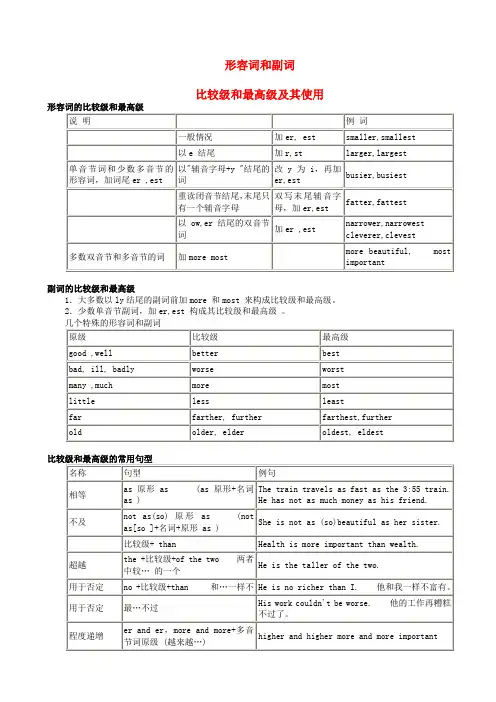
形容词和副词比较级和最高级及其使用副词的比较级和最高级1.大多数以ly结尾的副词前加more 和most 来构成比较级和最高级。
2.少数单音节副词,加er,est 构成其比较级和最高级。
比较级结构的修饰语1.用于原级之前:almost, nearly, just, exactly, quite, half , twice,three times , a third,etc.John is almost as tall as you.The river is three times as long as that one.We have a third as many students as we had last term.2.用于比较级前many, a few (用于"more +可数名词"前)It takes many more hours to go there by train than by plane.a lot, much , a bit, even, a little , still, a great deal, far, rather, two years, ten percent,three times etc.It's cold this year, but it's even colder last year.We produced 6% more grain this year than we did last year.3.用于形容词和最高级前the very , much the ,by far the ,the first/secondThis hat is by far the largest in the world.Gold is the very most valuable of all materials .位置与功能高考重点要求1.掌握形容词、副词比较级、最高级的常用句型及用法2.掌握形容词、副词的原级、比较级和最高级修饰语及倍数的比较表达。

形容词、副词高考考点导向对形容词和副词的考查力度会保持相对稳定,词义辨析、形容词、副词比较级和最高级的用法仍会是考查热点,尤需注意比较级在特定结构中的含义与结构省略。
此外也要掌握多个形容词修饰同一名词时的排列次序。
形容词及副词的考题在单项选择中原则上会出现,不超过15道题的题量,不可能每年都考查到,但在完形填空和短文改错中肯定会考查。
高考考题解析[考题1]NMET典型例题 It' awa difficut being in a foreign countr,_________if ou don't e B.natura C.baica D.ee表示“非常地”,选项B中的natura表示“自然地”,选项C中的baica表示“基本地;基础地”。
[答案]D[考题2]NMET 典型例题 _________to tae thi adventure coure wi certain earn a ot of uefu i.A. Brave enough tudent B. Enough brave tudentC Student brave enoughD Student enough brave[解析]enough修饰形容词时其位置应在形容词的后面,因此可排除B、D两项。
从题干结构来看,tudent应是句子主语,修饰主语的brave enough相当于一个定语从句,其位置应在主语后面。
[答案]C[考题3]NMET 典型例题t i genera beieved that teaching i _________it i a cienceA an art much aB much an art aC a an art much aD a much an art a[解析]本题主要涉及副词的同级比较以及同级比较中插入名词、冠词后的语序问题。
a...a结构形式如下:a ad. a/an n. a...或a adv.a。
形容词和副词的比较级和最高级讲解与练习一、变化规则①一般的比较级和最高级在形容词或副词后加-er或-est,如:small --- smaller --- smallest②以不发音-e结尾的形容词或副词直接加–r或–st,如:large --- largest --- largest③重读闭音节词尾是一个辅音字母的,需双写该辅音字母,再加-er或-est。
如:big---bigger---biggest④以辅音字母加y 结尾的形容词和副词,把“y”变“i”,再加–er或-est. 如:busy---busier---busiesthappy---happier---happiest⑤一些双音节及多音节形容词或副词前要加more和most,如:slowly --- more slowly --- most slowlybeautiful---more beautiful---most beautiful还有一些不规则的变化:原级比较级最高级goo/ well better bestmany/ much more mostbad / badly(坏地)worse worstlittle less leastold older(年龄)/ elder(辈份) oldest/ eldestfar farther距离/ further(程度)farthest/ furthest二、形容词和副词的等比句型①as+原级+as …和……一样I’m as tall as you.②not as(so)+原级+as 不和……一样(在否定句中常用so 来代替as)如:I can’t run so fast as you.另外as…as possible 为固定结构“尽可能的”如:as soon as possible, as quickly as possible “尽快”等。
在以上两个句型中形容词或副词一定要用原级。
形容词和副词(一)形容词的基本功能及其在句子中的位置说明人或事物的特征、性质或状态,常用来修饰名词或不定代词的词叫形容词。
1.形容词作定语,放在名词之前,不定代词之后。
e.g.The beautiful girl is my sister.那个漂亮的女孩是我的妹妹。
I have something important to tell you.我有重要的事情要告诉你。
3.作宾语补足语,放在宾语之后。
e.g.You must keep your eyes closed.你必须闭上眼睛。
I find it hard to travel around the big city.我发现在这个大城市旅行很难。
4.某些形容词放在定冠词之后,变成名词,表示一类人。
常见词有good/bad,rich/poor,young/old,deaf/blind,black/white,living/dead等。
e.g.The rich should help the poor.富人应该帮助穷人。
The young should be polite to the old.年轻人应该对老年人有礼貌。
(三)形容词原级用法2.有表示绝对概念的副词very,so,too,enough,quite等修饰时用形容词原级。
e.g.The boy is too young.这男孩太小了。
Math is very difficult.数学很难。
3.表示A与B在某一方面程度相同或不同时用形容词原级。
(1)肯定句中的结构:“A…+as+形容词原级+as+B”e.g.English is as interesting as Chinese.英语和语文一样有趣。
Xiao Ming is as tall as Jim.小明和吉姆一样高。
(2)否定句中的结构:“A…+as/so+形容词原级+as+B”e.g.This book isn’t as new as that one.这本书不如那本书新。
I am not so careful as Lucy.我没有露西仔细。
(3)表示“A是B的……倍”时,用“A…+倍数+as+形容词原级+as+B”结构。
(一次:once,两次:twice,三次以上:数字+times)e.g.Our school is three times as big as theirs.我们学校是他们学校的三倍。
This table is twice as long as that one.这张桌子是那张桌子的两倍长。
(四)形容词比较级用法1.表示两者进行比较时用形容词比较级,最明显的提示词是than,其结构为“A…+比较级+than+B”。
e.g.Li Lei’s room is bigger than mine.李雷的房间比我的大。
This mooncake is nicer than that one.这块月饼比那块好吃。
注意:为了避免重复,在从句中常用the one,that,those等词来替代前面出现过的名词。
其中the one替代可数名词单数形式,the ones或those替代可数名词复数形式,that替代不可数名词。
e.g.The weather in Beijing is colder than that in Guangzhou in winter.北京的天气比广州的天气冷。
2.有表示程度的副词a little,a bit,a few,a lot,much,even,still,far,rather,any等修饰时,用形容词比较级。
e.g.I feel even worse now.我现在觉得更难受了。
It is much colder today than before.今天比以前冷得多。
3.表示两者之间进行选择“哪一个更……”时,用句型“Which/Who is+形容词比较级,A or B?”表示。
e.g.Who is taller, Li Ming or Wang Tao?李明和王涛哪一个高一些?Which sweater is more beautiful, the yellow one or the pink one?哪一件毛衣更漂亮,黄色还是粉红色的?4.表示“几倍于……”时,用“倍数+比较级+than”表示。
e.g.I am three years older than you.我比你大三岁。
5.表示“两者之间最……一个(of the two)”时,常用“the+比较级”结构。
e.g.Mary is the taller of the twins.Mary是双胞胎中的高个子。
6.表示“越来越……”,用比较级重叠结构,即“比较级+and+比较级”,多音节词和部分双音节词时用“more and more+形容词原级”。
e.g.It’s getting warmer and warmer in spring.春天天气变得越来越暖和。
Our hometown is becoming more and more beautiful.我们的家乡越来越漂亮了。
7.表示“越……就越……”时,用“the+比较级,the+比较级”结构。
e.g.The more we get together, the happier we’ll be.我们越是在一起,就越开心。
(五)形容词最高级用法1.表示三者或三者以上的人或物进行比较时,用最高级形式。
形容词最高级前必须加定冠词the,句末常跟一个in/of短语来表示范围。
e.g.He is the strongest of the three boys.在三个男孩子中,他是最强壮的。
Shanghai is the biggest city in China.上海是中国最大的城市。
2.表示在三者或三者以上的人或物进行选择时,用“Which/Who is+the+最高级,A,B or C?”结构。
e.g.Which city is the most beautiful, Beijing, Shanghai or Fuzhou?哪个城市最漂亮,北京,上海还是福州?3.表示“最……的……之一”时,用“one of the+形容词最高级”结构,该形容词后面的名词要用复数形式。
e.g.Zhou Jielun is one of the most popular singers.周杰伦是最受欢迎的歌星之一。
4.形容词最高级前面可以加序数词,表示“第几最……”。
e.g.The Changjiang River is the first longest river in China.长江是中国第一大长河。
5.形容词最高级前面可以有物主代词,指示代词,名词所有格等修饰,但此时不能再用定冠词the。
e.g.This is our last lesson today.这是我们今天的最后一节课。
Yesterday was his busiest day.昨天是他最忙的一天。
6.形容词比较级结构可以表示最高级含义。
e.g.Li Lei is the tallest student in his class.李雷是班上最高的学生。
=Li Lei is taller than any other student in his class.李雷比班上其他任何一个学生都高。
=Li Lei is taller than the other students in his class.李雷比班上其他所有的学生都高。
=Li Lei is taller than anyone else in his class. 李雷比班上其他任何人都高。
牢记下列结构:比较级+than+any other+单数名词all (the) other+复数名词any one/anybody elseany of the other+复数名词the rest of+复数名词或不可数名词注意:在同一范围内进行比较时,必须把主体排除在被比较的范围之外。
e.g.China is larger than any other country in Asia.中国比亚洲其他任何一个国家都大。
(同一范围内,只能和其他对象进行比较)China is larger than any country in Africa. 中国比非洲的任何一个国家都大。
(不同范围内,可以和其他任意一个对象进行比较)3.在两者进行比较“表示A不如B”时,多音节和部分双音节形容词除使用“not…as/so+形容词原级+as”结构外,还可使用“less+形容词原级+than”结构。
e.g.I am not as careful as Lily. 我没有Lily仔细。
=I am less careful than Lily.4.许多形容词加-ly可以构成副词,但有些-ly结尾的词不是副词,而是形容词。
friendly(友好的) lonely(孤独的,孤单的) lovely(可爱的,有趣的)likely(有希望的) daily(日常的) lively(有生气的,活泼的)上面我们复习了形容词,下面我们复习副词,副词分为“①时间副词,如yesterday(昨天);②地点副词,如inside(在里面);③方式副词,如quickly(快地);④程度副词,如very(很);⑤疑问副词,如when(什么时候);⑥关系副词,如why(为什么)。
关系副词用来引导定语从句。
有些知识如时间、地点,是非常明显的东西,只需要提一下。
今天我们主要复习以下几个方面:副词用法(一)副词是用来说明时间、地点、程度、方式等概念的词,主要修饰动词、形容词、其他副词或整个句子。
4.enough修饰形容词和副词时,要放在所修饰词之后。
e.g.The boy is old enough to go to school. 这孩子够大了能去上学。
He got up early enough to catch up the train. 他起得足够早能赶上火车。
(三)副词比较等级用法1.副词的比较级、最高级的变法和形容词的比较级、最高级变法基本相同。
刚才我们已经讲过。
2.在两者进行比较“表示A不如B”时,部分双音节和多音节副词除使用“not…as/so+副词原级+as”结构外,还可使用“less+副词原级+than”结构。
e.g.Bill didn’t do his homework as carefully as Jim. Bill做作业没有Jim认真。
e.g.Lin Tao did best in English of all. 林涛是所有人中英语最好的。
(四)副词易混知识清单1.how long,how soon,how oftenhow long“多久,多长时间”,是对一个持续的时间段提问,常用“for+段时间”和“since+点时间”回答。